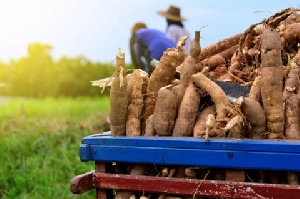 The factory will give a boost to cassava farmers
The factory will give a boost to cassava farmers
A 200-tonnne-a-day starch processing plant, estimated to cost US$25million, is to be set-up in the Nkwanta South district of the Volta Region.
The project, which is expected to be completed within 12months, is expected to help reduce the country’s starch import bill and improve the income of rural cassava farmers.
Data from the Statistical Service indicate that the country produces about 16 million metric tonnes of cassava, of which about 11 million tonnes are available for human consumption.
However, only four million tonnes out of the available 11million tonnes of the cassava available for human consumption is consumed – leaving over seven million tonnes as surplus.
Gershon Gbediame, former Member of Parliament for Nkwanta South (L); Nanan Olivier Kablan (middle, in black suit), Project Promoter; and Suchart Chuveeradach (R ) of KORAT SW Group of Thailand.
Addressing the press during a signing ceremony between GMC Universal Ghana Limited and KORAT SW Group of Thailand in Accra last Friday, Project Consultant Kodwo Ahlijah said cassava starch serves as a rural staple food, convenience food for urban dwellers, industrial raw material, cash-crop, and foreign exchange earner given its high demand on the world stage.
“As a nation we have been importing the starch, and a number of companies are being encouraged to go into the starch business. Because of this, the Project promoter took the initiative with his business consultants and lawyers to come up with the idea of setting up a starch processing factory at Nkwanta South,” Mr. Ahlijah said.
He also added that in the light of previous experience of challenges in getting adequate feed stock, a decision was made to set it up in Nkwanta South – where there are large tracts of land to go into cassava plantation purposely for the factory.
Mr. Ahlijah also explained that one of the driving factors to go into starch was based on research by a division of NEPAD of the African Union, which commissioned a study by the International Firm of Consultants on the Cassava market opportunities in Ghana, Mozambique and Nigeria.
In the said research, it was established that Ghana locally needs over 200,000 metric tonnes of starch which can easily be produced out of cassava.
Furthermore, he stated that once the factory is set up there will be a need for government intervention to support the infrastructural deficit in the area, which he reckons has been the major challenge of agro-processing companies.
Mr. Nanan Olivier Kablan, the CEO, signed on behalf of GMC Universal Ghana Ltd., and Mr. Suchart Chuveeradach signed on behalf of KORAT SW Group of Thailand.
GMC Universal Ghana Limited secured the funding from COSMOS International of India.
Present at the signing ceremony were representatives of the Landowners of Bontibor, Nkwanta South district who have agreed to lease for 50 years 10,000 hectares (25,000 acres) of farmland for development of the industrial cassava plantation. The Landowners were led by Gershon Gbediame, former Member of Parliament for Nkwanta South.
It has also been agreed that a block farming system will be adopted for developing the cassava plantation.
About 2,400 block farmers will be engaged to manage the initial 4,800 hectares of farmland; and they will be supported with all mechanisation in the value chain as well as given weekly advances to be set off against harvesting.
KORAT is the largest manufacturer of cassava turnkey starch processing plants in Thailand and South East Asia and has since 1995 delivered an average three (3) processing plants per year.
They already have an agreement with Asikess Ventures Limited at Begoro-Aburaso under the One District, One Factory Programme, funded by Ghana EXIMBANK, to manufacture and install a 100 tonnes per day cassava starch processing plant
The Statistics, Research and Information Directorate (SRID) of the Ministry of Food and Agriculture 2013-2014 report said cassava has traditionally been consumed in the form of fresh cassava roots and processed products such as Gari, Kokonte, Agbelema among others.
Incomes from cassava production and post-harvest processing of cassava represent around one fifth (22 percent) of Ghana’s agricultural GDP.